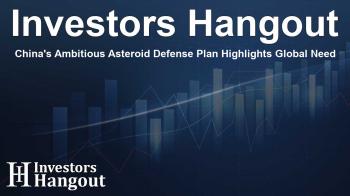China's Ambitious Asteroid Defense Plan Highlights Global Need

China's Strategic Blueprint for Asteroid Defense
Chinese scientists recently revealed a comprehensive plan aimed at defending against near-Earth asteroids during a prominent space exploration conference. This initiative highlights the necessity for global partnerships to safeguard our planet's future.
International Deep Space Exploration Conference
The third International Deep Space Exploration Conference convened in a significant location in China, gathering over 400 participants from more than 40 countries. The focus of this gathering was asteroid exploration, defense strategies, and resource utilization, all critical to the sustainability of life on Earth.
Innovative Defense Measures
During the event, a key figure in China's lunar exploration program discussed the importance of an organized strategy under the supervision of the United Nations Committee on the Peaceful Uses of Outer Space. The proposed framework for asteroid defense entails thorough monitoring, robust early warning systems, and systematic responses to potential threats.
This plan aims to establish an efficient detection and defense mechanism for near-Earth asteroids, supported by a collaborative space-ground monitoring infrastructure. Such a system would ensure timely alerts and operational readiness, according to the chief scientist of the Deep Space Exploration Lab.
Historical Context of Asteroids
Scientists recognize that near-Earth asteroids pose significant hazards. Historical events, such as the extinction event caused by a massive asteroid impact 66 million years ago, underline the need for vigilance. More recently, other incidents, including the Tunguska explosion and the 2013 Chelyabinsk meteor, serve as stark reminders of the risks these celestial objects present.
China's Preparedness and Progress
China's journey toward asteroid defense has been ongoing, with initiatives dating back to 2006 when the China National Space Administration initiated a survey program for near-Earth objects. Notable advancements include the successful launch of the Tianwen-2 probe, aimed at sampling the near-Earth asteroid 2016HO3.
Additionally, China acknowledges its growing observational capabilities, deploying advanced telescopes across the country to enhance its monitoring of asteroids, which will be essential in predicting and mitigating risks.
Global Cooperation for Planetary Security
The establishment of the International Asteroid Warning Network and the Space Mission Planning Advisory Group in 2014 marked a significant milestone in international collaboration for asteroid defense. China actively participates in these global efforts, reinforcing its commitment to planetary security.
Encouraging International Collaboration
At the conference, global scientists expressed strong support for China's asteroid defense strategy. Notably, a representative from the United Nations Office for Outer Space Affairs emphasized the importance of collaboration in addressing the dual threats and opportunities posed by asteroids.
Wu Weiren, a prominent figure in China's space initiatives, invited international partners to join in various collaborative efforts, from monitoring and research to data-sharing, all essential for developing comprehensive asteroid defense capabilities.
Deep Space Economy Initiatives
China is not only focused on defense strategies but is also advancing its goals in space resource utilization. The conference showcased initiatives aimed at developing a deep space economy, emphasizing cooperation for mutual benefit.
There is growing interest in the vast resources within near-Earth asteroids, which contain valuable materials including iron and water, potentially transforming the future of space exploration and supporting human endeavors beyond our planet.
Conclusion: A Collective Responsibility
China’s commitment to asteroid exploration and resource utilization underscores the need for a united global approach to space challenges. The successful development of asteroid defense capabilities is not just a responsibility for one nation but a shared mission for humanity, ensuring the safety and sustainability of our planet.
Frequently Asked Questions
What is the main focus of China's asteroid defense plan?
The plan emphasizes monitoring, early warning systems, and systematic responses to protect Earth from near-Earth asteroids.
How does global cooperation play a role in this initiative?
International partnerships are crucial for sharing data, technology, and research efforts to enhance asteroid defense capabilities.
What historical events highlight the importance of asteroid defense?
Events such as the dinosaur extinction and the Tunguska explosion underscore the potentially catastrophic impacts of asteroid collisions.
What is the deep space economy?
The deep space economy involves utilizing resources from celestial bodies, promoting sustainable exploration and development in space.
How is China enhancing its observational capabilities?
China has deployed advanced telescopes to improve monitoring of asteroids and increase the effectiveness of its defense strategies.
About The Author
Contact Olivia Taylor privately here. Or send an email with ATTN: Olivia Taylor as the subject to contact@investorshangout.com.
About Investors Hangout
Investors Hangout is a leading online stock forum for financial discussion and learning, offering a wide range of free tools and resources. It draws in traders of all levels, who exchange market knowledge, investigate trading tactics, and keep an eye on industry developments in real time. Featuring financial articles, stock message boards, quotes, charts, company profiles, and live news updates. Through cooperative learning and a wealth of informational resources, it helps users from novices creating their first portfolios to experts honing their techniques. Join Investors Hangout today: https://investorshangout.com/
The content of this article is based on factual, publicly available information and does not represent legal, financial, or investment advice. Investors Hangout does not offer financial advice, and the author is not a licensed financial advisor. Consult a qualified advisor before making any financial or investment decisions based on this article. This article should not be considered advice to purchase, sell, or hold any securities or other investments. If any of the material provided here is inaccurate, please contact us for corrections.

